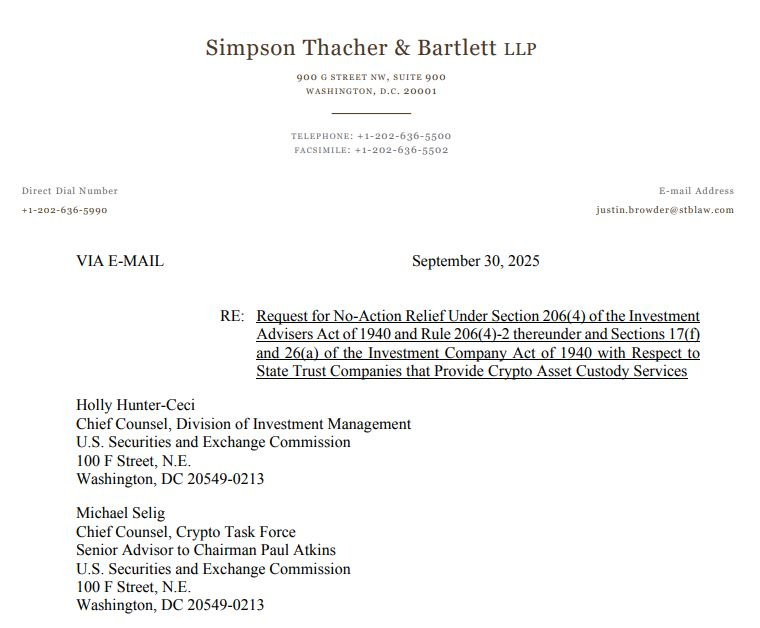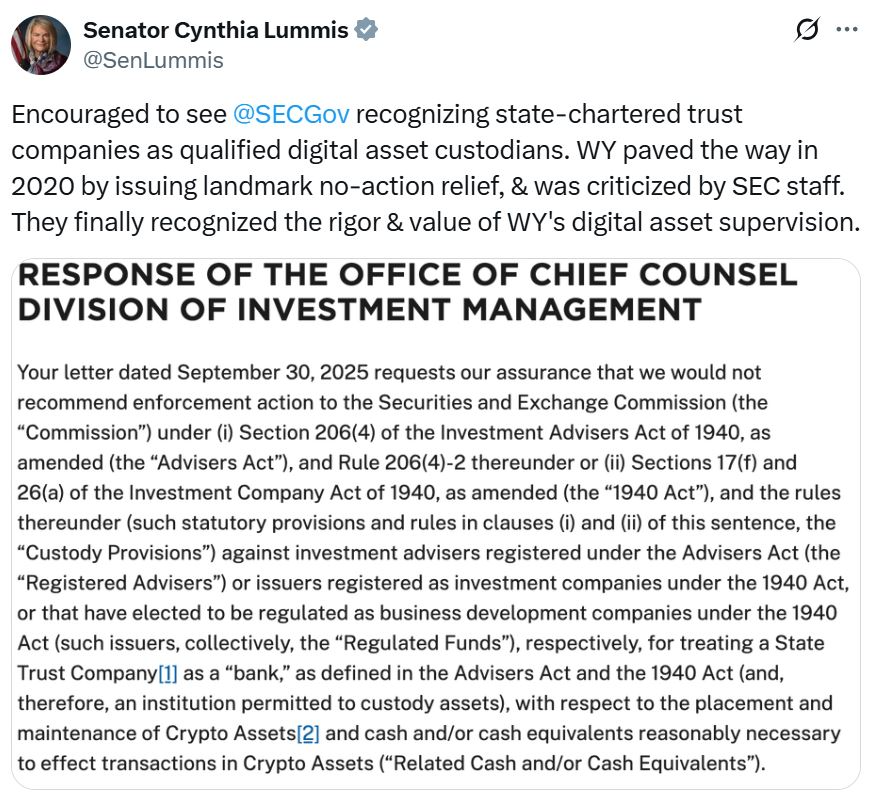SEC Open to Advisers Using State Trusts for Crypto Custody
The US Securities and Exchange Commission staff has opened up to allowing investment advisers to use state trust companies to custody cryptocurrency assets.
In a rare no-action letter, the SEC’s Division of Investment Management said on Tuesday that it wouldn’t recommend that the SEC take enforcement action if advisers used state trust companies as a crypto custodian.
Law firm Simpson Thacher & Bartlett had sent a letter to the Division on Tuesday, wanting assurances that registered financial institutions, such as venture capital firms, wouldn’t be subject to enforcement action by the regulator if they custody crypto assets.
It’s the second no-action letter from the SEC this week, a sign of the agency’s hands-off approach to crypto enforcement under the Trump administration, which has promised to ease regulatory oversight of the sector to attract companies and projects to the US.
Interim step to broader changes
SEC staff said in the letter that state trust companies can be used as custodians, provided it has procedures designed to safeguard crypto, and the adviser and fund managers follow specific criteria, such as performing due diligence and determining it is in the best interest of their clients.

Division of Investment Management director Brian Daly said in a statement shared with Cointelegraph that the letter is an “interim step to a longer-term modernization of our custody requirements.”
“This relief unlocks a larger universe of crypto custody options, subject to important safeguards.”
The SEC said in its regulatory flex agenda that it will propose amendments to custody rules. Under current regulations, the Investment Company Act and the Investment Advisers Act require that client assets be held by a list of qualified custodians, such as banks.
Peirce, analysts, back change
SEC Commissioner Hester Peirce said the guidance eliminates the “guessing game” registered advisers and regulated funds have been forced to play while choosing an entity for crypto asset custody, and that it will ultimately “benefit advisory clients and fund shareholders.”
She added that it covers client crypto assets held by registered advisers or crypto asset investments of regulated funds that are subject to the respective custody provisions, and also tokenized securities.
“This moment also presents us with an opportunity to consider whether the custody requirements applicable to registered advisers and regulated funds should be improved and modernized, such as through principles-based rules.”
Bloomberg ETF analyst James Seyffart applauded the decision in an X post on Tuesday, calling it a “textbook example of more clarity for the digital asset space. Exactly the sort of thing the industry was asking for over the last few years.”
Pseudonymous crypto trader Marty Party was also in favor of the SEC’s letter, and predicted it would result in “many more crypto custodians,” which they said would be “great news for crypto adoption.”
Wyoming Senator Cynthia Lummis, meanwhile, was “encouraged to see the SEC recognizing state-chartered trust companies as qualified digital asset custodians,” and also pointed out her state made a similar move in 2020, which the Biden-era SEC condemned at the time.

Crenshaw calls letter “troubling”
The agency’s sole Democrat commissioner, Caroline Crenshaw, criticized the letter, arguing that any changes to existing regimes should be made through rulemaking, along with public comment and economic analysis.
Related: SEC weighs plan to allow blockchain-based stock trading amid crypto push: Report
She added the Division’s move “bores a troubling hole” in the existing rules and unfairly disadvantages applicants seeking national charters from the Office of the Comptroller of the Currency to offer crypto custody services.
“With today’s action, state trust companies can bypass the entire OCC application process in which others are participating conscientiously,” she said.
“The basic principle underpinning our statutes and rules regarding investment adviser and investment company custody is trust. Deciding whom to trust as a custodian is a high-stakes and important question.”
Magazine: Lawmakers’ fear and doubt drives proposed crypto regulations in US


